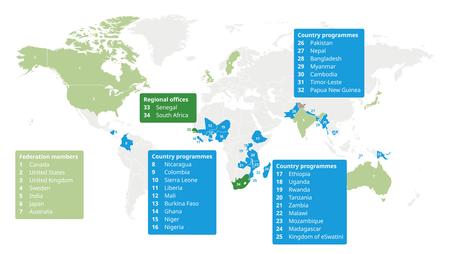Access to clean water, decent toilets and handwashing facilities for employees at work, in supply chains and within employees’ communities is essential.
It strengthens the health and wellbeing of the workforce, cuts medical and sick pay costs, and boosts staff motivation and productivity. It is also a way for companies to raise their brand value, build resilience and reduce risks in the supply chain.
Between 2018 and 2022, WaterAid – in collaboration with Diageo, Gap Inc., HSBC, Twinings and ekaterra (which was part of Unilever when this project started)– conducted a first-of-its kind research project to show the business benefits of investing in water, sanitation and hygiene (WASH).
The project set out to test our theory around quantifying business benefits and generate robust evidence of the financial value of investing in WASH, to encourage more companies to invest in these vital services.
The project set out to test our theory around quantifying business benefits and generate robust evidence of the financial value of investing in WASH, to encourage more companies to invest directly in their own business facilities and leverage their influence to persuade suppliers to act.
Data was collected from ten workplaces in four different sectors across four countries: tea estates in India and Kenya, apparel and leather supply chains in Bangladesh and India, and agricultural smallholder farmers in Tanzania.
The project looked at the effect WASH has on productivity, absenteeism, attrition, punctuality and the number of medical incidents at each workplace. Where possible, a return on investment was calculated – along with projections for investment over a ten-year period – and valuable insights were identified for how to best ensure WASH facilities, promote productivity and drive other business benefits so that companies, brands and suppliers see the positive impact.
Quick Links
- Boosting Business | Impact Report
- Boosting Business | WASH investment in three tanneries in India (case study)
- Boosting Business | WASH investment in ready made garment factories in Bangladesh (case study)
- Boosting Business | WASH investment in smallhold farmers in Tanzania (case study)
- Boosting Business | WASH investment in Tea Estates in India (case study)
- Boosting Business | WASH investment in Tea Estates in Kenya (case study)
- Boosting Business | Press Release
- Q+A with WaterAid's Managing Director of Partnerships, Sarah Dobsevage, on why the Boosting Business report is so important
Boosting Business Impact Report
Everyone, everywhere has the right to water and sanitation – at home and at work. Our research shows that investing in these facilities should not be seen as another costly business expense, but a sound investment with a ripple effect far beyond the bottom line.

India | WASH investments in three tanneries in Unnao, Uttar Pradesh, resulted in:
29%
decrease
in absenteeism

1.59%
increase
in productivity

6%
increase
in punctuality

Leather tanneries in India
Improvements to three tanneries in Unnao, Uttar Pradesh, resulted in a 29% decrease in employee absenteeism, a 1.59% increase in productivity and a 5.97% increase in punctuality

Bangladesh | WASH investments in ready made garment factories resulted in:
35%
increase
in product quality

15%
decrease
in absenteeism

19%
decrease
in medical costs

Garment factories in Bangladesh
Improvements to WASH facilities in three ready-made garment factories in Narayanganj resulted in a 35% increase in product quality, a 15% decrease in employee absenteeism and a 19% decrease in medical costs

Curious to learn more?
If you are interested in WASH investment for your business, please complete the short form below and our Business Team will be in touch.
Coming soon:
- WASH impact data from tea estates in Kenya
- WASH impact data from smallholder farming in Tanzania
- Q+A interview with our Director of Institutional Philanthrophy, Sarah Dobsevage, discussing the importance of this data for the business community.

